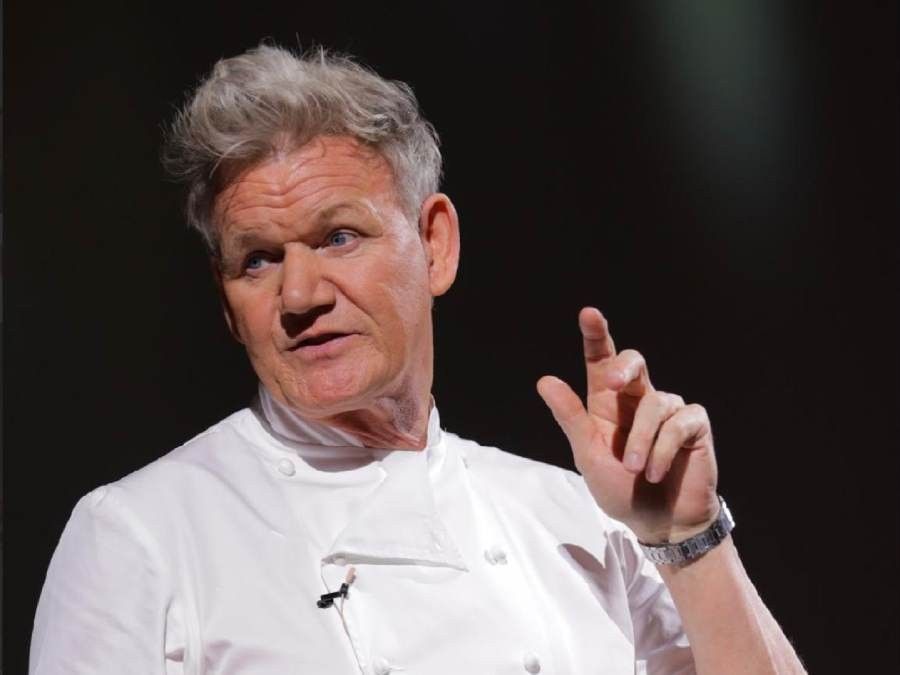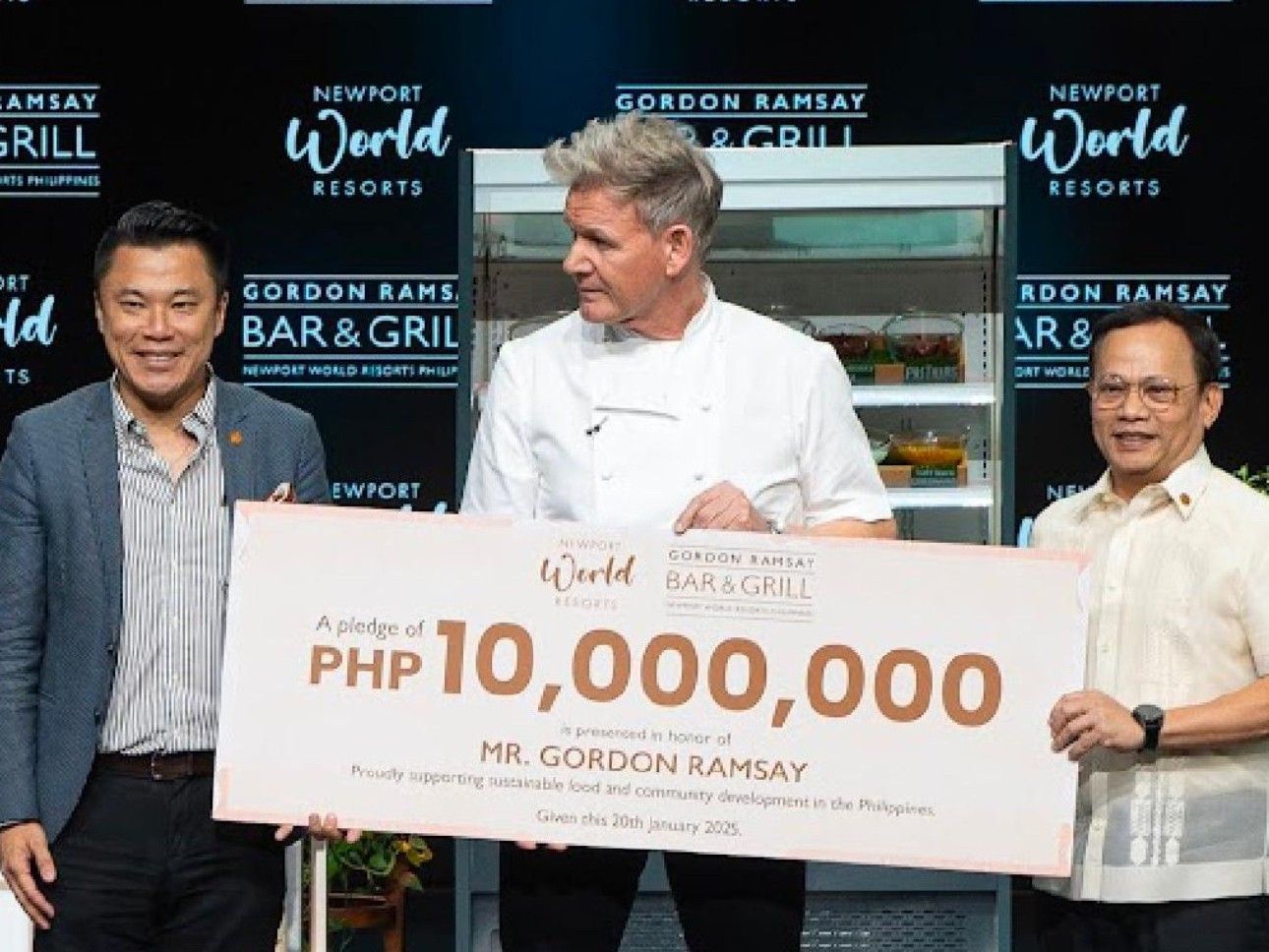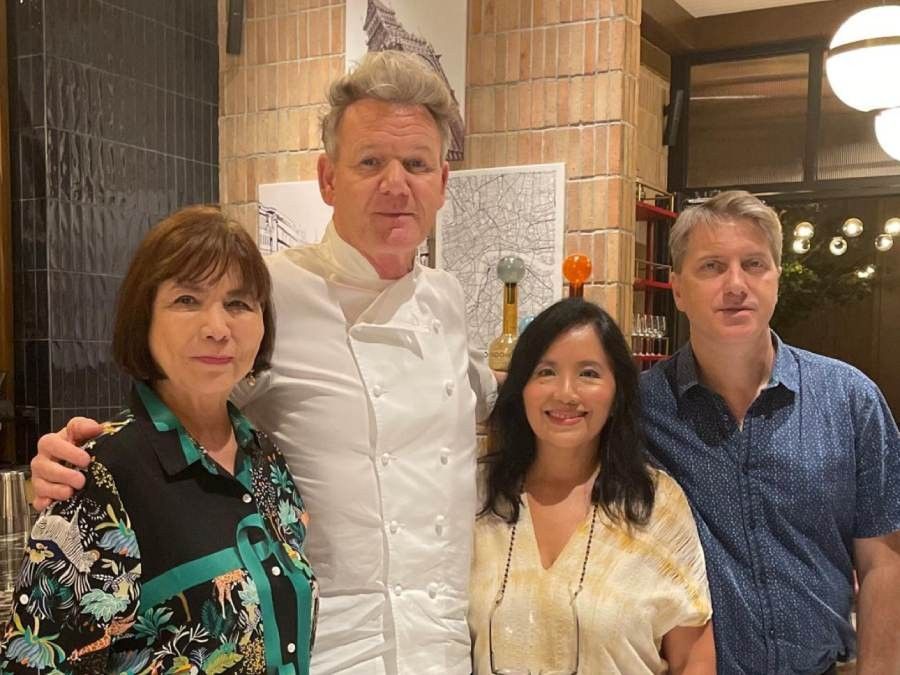Gordon Ramsay: ‘What makes me cry? My children, because of their humbleness’

Celebrity chef Gordon Ramsay has made countless cooks cry in the kitchen, so we decided to ask the culinary icon what makes him cry. The legendary host of Hell’s Kitchen, The F Word and Kitchen Nightmares is in Manila to formally launch his Gordon Ramsay Bar & Grill at Newport World Resorts in Pasay City and hosted a halo-halo cookoff at the Newport Performing Arts Theater in front of a cheering crowd of food enthusiasts and culinary students.
Dressed in chef’s whites, towering over most Pinoys at a fit 6’2” and ready for Manila, the bestselling author and king of his own empire, Gordon Ramsay Restaurants, sat down with us at his resto and was keen to promote the quality of Filipino chefs, ingredients and dishes; to talk about what spells the difference between dream kitchens and kitchen nightmares, and to show he’s fully engaged with the country he calls the “Sleeping Beauty” of Asian cuisine.
MILLET MANANQUIL: You met Kevin Tan in Macau. Tell us what made you agree to open in the Philippines.
GORDON RAMSAY: Kevin Tan is an exciting, prolific entrepreneur. I think his vision and his understanding of what he wanted for his properties is compatible with us in terms of that, so I always think about, like, trust and respect. Do I like him? In abundance. Can I trust him? Absolutely. Do I respect him? 100 percent.
So what he's done and the communities he's been building — I always check on how long members of his team have been with him, and it's always a nice one for me. When people have been by your side for 10, 15, 20 years, it tells the truth, right there. So I think he's one of the most visionary individuals I've seen. What he's done with the resorts. And you know, the difference he's made, the impact he's made. So, yeah, that was a given.
MILLET: So, the Gordon Ramsay restaurant here has been fully booked since it opened. How do you describe the Philippine market so far? What have been the favorites of the locals?
GORDON: For me, we have to remind ourselves, (the Philippines is) like the Sleeping Beauty of Asia. We never had that look-in before, because it was always about Thai, Southeast Asia.
So finally, let's give it the recognition it deserves, a population that spans over 115 million people.
And so, I think of the fragrance and the culture the Filipino presents. It’s standalone, incredible.
Then I'm looking at restaurants in New York. Top 10 New York Times list, a Filipino restaurant is number one; Melbourne, Filipino restaurant number one; London, Filipino restaurant number one. And so, there's this surge of these young, dynamic chefs that have gone out, left their comfort zone and are really putting Filipino food on the map. So, to be here in that moment is exciting.

MILLET: What advice you would give to aspiring restaurateurs so as not to have a “hellish” kitchen?
GORDON: Number one: knowledge. Customers are king. They vote with their feet. We've been deprived of four years of eating out because of COVID. So now everyone wants fun back in the west, and so my advice to every young chef is, Listen to your customers. They're king. They don't tell you they're not going back. They just don't come back. They disappear. So stay close to them. Stop worrying about becoming international. Become great in the neighborhood. Build that intensity locally. Get the following locally, because it's the locals you want Monday to Thursday, and the tourists Friday, Saturday, Sunday. But those first beginnings of the week, Monday to Thursday, is all about locals.
THERESE GARCEAU: Are you familiar with Filipino ingredients, and are you currently using them here at your restaurant?
GORDON: Yeah, I mean the whole research development with adapting local ingredients, there's something quite unique about the regionality of Filipino food, and it has a historic background. And so I'd be stupid not to embrace what's happening locally. Lapu-lapu, for instance, is our fish and chips. And so we salt it, marinate it, and it's as good as some of the cod coming out of the North Atlantic. And I think of the sinigang. The white fish stew, we marinate it, phenomenal, absolutely. Adobo, with a belly of pork.
I understand the culture here, and it’s incredible. It needs to be respected. I’d love to show some evolution with taking the ingredients, combine it with the uniqueness of what’s happening locally, and then bending myself into that culture is super-important.
Two years ago, when I first met Kevin — I started my travels around 2002 — I was on an advisory board for Singapore Airlines, even then the nuances of Filipino cuisine were present. But because of Thai And other regional cuisines, Filipino cuisine never got the look it deserves. It's standalone. It has an identity that needs to be respected.
THERESE: How much would you say you’ve mellowed over the years?
GORDON: God, I'm still incredibly passionate. I still get incredibly upset when things go wrong, but I think that's my sporting background, because I take it so personally, and yes, it's only food. We're not curing cancer, so we have to put it into perspective, but I still get incredibly upset when things go wrong. So that's me. I'm a passionate guy. It's obvious. I never want to change that.
THERESE: What do you think will be the most important food trends for 2025?
GORDON: I think some of the food trends now today are fermenting. It’s interesting, just the healthy side to that, and the Koreans have been doing it for centuries with kimchi.
More protein into the diet, that’s absolutely crucial.
And then I think we've got to say goodbye to the spheres and the foams and get back to the nostalgia ingredients. Respecting the ingredients, not trying to change them to something they shouldn't become, staying true to the flavor profile, and not getting too clever. That's crucial for a kitchen.
But fermenting is on everyone's agenda, from fermenting, sauces, vegetables, textures, that's going to be apparent. A lot healthier: less fat, less dairy, less cream, less butter. So a lot more acid, or vinegar, that's on the cusp to explode.
SCOTT GARCEAU: Is it on the cusp of being incorporated into your own menu here?
GORDON: Yes, good question, we just opened. And so I get nervous when we’re full before we open. We announced the reservations, and there was 10,000 reservations in the first three days. And we've got 75 seats. And so it's busy. It's very busy.
I look at the behavior of our young Filipino chefs and how their palates are getting excited about the western side. But I tell them all the time, hold on to your DNA. Hold on to that. And so I want to get the best out of them as well. Like the lapu-lapu, doing all that testing of the fish, the marinade, the salting of it. How do you perfect a beautiful fish and chips with your lapu-lapu?
SCOTT: You spoke about your passion still in the restaurant, so I was wondering what the most inexcusable sin might be in your kitchens?
GORDON: Yeah, it's funny, isn't it? Because people see Kitchen Nightmares and they think, why are they doing it? The big issue we have is that anybody can open a restaurant. It's not like a doctor doing surgery. You have to go and study medicine, or train to become a basketball pro.
Sadly, anyone can open a restaurant. That's the most destructible thing. So I'm not a big fan of laziness. Food needs to be respected. Needs to be on time, and there needs to be a certain precision, a certain effort that you put into these ingredients to get something back. And we get it back via the customer's face, their memory, their social media posts.
So discipline is crucial.
SCOTT: Since you’re globetrotting, you're all around the world, how do you divide your time between restaurants, TV shows and other projects?
GORDON: It's taken a long time to get there, but we're in control of our destiny, and so we have a schedule that operates sort of 14 to 18 months out. So everything is preplanned, pre-organized, pre-booked. There’s real military precision. So I landed yesterday morning at 6 a.m. and I showered and changed, no TV crew, no press and no journalists, and I came down in my chef’s jacket, and I met all the team. I sat, I had breakfast with the team, and then we were full for lunch and full for dinner last night.
So I want to tap into what's happening locally before the intrusion comes. So my life is planned within an inch, and I have an Ironman coming up in July, so I'm on a very strict training policy. I swam this morning in the dark at half past four upstairs on the top floor. Wherever I go, I can either go for a run, swim or a quick bike ride somewhere in the world.
And I have one date every six months that I stick to, and that keeps everything straight and narrow.
THERESE: Do you ever miss cooking?
GORDON: Do I miss cooking? Never. I look at the London Symphony Orchestra, it's the same as a chef. There's one conductor, 180 in that orchestra. And it's no different. I'm developing dishes. I'm at the forefront, tasting, and bringing that knowledge back to the kitchen.
What I've learned, I cook enough not to miss it, but I've done my time. I think you can see that on the lines on my face. I didn't tiptoe over this — I’m 58 years of age. But what you're seeing today is, you know, built over three decades of experience and a lot of cooking.
MILLET: You've done it all. What’s left?
GORDON: To conquer the Philippines. That's what I said we had to do. I can tell you exclusively that tomorrow morning, I'm going to look at three new sites for further development, and I'd like to bring more jobs, excitement and impressions to Manila.
THERESE: In all your travels, what are your top three countries to eat in?
GORDON: Tough one. Well, first of all, the Philippines. I look at the abundance of young chefs now in terms of getting the profile they deserve. This young lady in New York who's heading towards a Michelin star, and to see that 20 years ago — and so why not? Fantastic.
I fell in love with Australia years ago, just because of the freedom they have. They're not governed by any guide. They're just adventurous and incredibly sought after.
And then Patagonia is next on my list. That's my next agenda. I'm very lucky to have a show on Disney called Uncharted, where I go off and I go on discovery, I stay away from the tourists, and I discover that way. And I'd like to do more regional cooking here in the Philippines as well.

MILLET: What makes you cry?
GORDON: What makes me cry? My children, because of their humbleness. Being a parent is tough, and they have so many distractions, growing up with platforms and influences, etc.
So our eldest daughter Megan is a police officer putting her staff vest on every night to go out, and that makes me cry.
Our son Jack is a Royal Marine commando so he's fighting for the country. That makes me cry.
And Matilda is traveling around the world, picking up knowledge, gathering knowledge — that makes me upset when I can't get ahold of her. Tilly has just graduated culinary school. I was a little bit concerned that she didn't want to be taught by her father. She went to another culinary school in Ireland.
Holly is getting ready — we just found out that she and Allen are getting married. That's amazing.
And then Oscar's playing havoc, and Jesse James has already started kicking the ball yesterday at soccer practice with a whisk in one hand and a ball in the other, so fingers crossed. It's going to be soccer or cooking.
So, yeah, my children make me proud.
And spending too much time with journalists makes me cry.



















